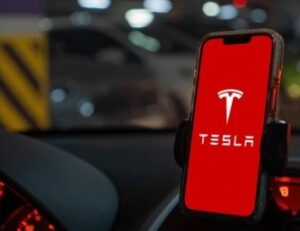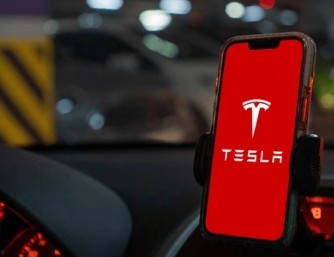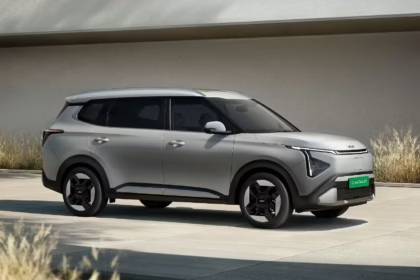Tesla has signed a lease for its first showroom in Mumbai, India, marking a major step to establishing a foothold in one of the world’s most exciting automotive markets. There are many challenges ahead, but this move marks the start of a new chapter for the Electric Vehicle (EV) giant as it seeks to capitalize on the growing Indian market.
It has no plans on relinquishing the Indian EV market that has been one of the last leading sellers, thanks to being one of the few untapped frontiers for EV suppliers to start selling their vehicles in the country, and it leasing a venue in the commercial centre of Bandra Kurla Complex (BKC) in Mumbai.
The Lease Agreement
Tesla’s five-year lease agreement, starting February 16, 2025, also lays the groundwork for the automaker to display its electric vehicles in one of India’s most robust and varied cities. The company will take a 4,003 square foot (372 square meters), almost basketball court-sized retail space in the upscale Maker Maxity building located in Bandra Kurla Complex.
According to the lease documents, Tesla will pay about $446,000 in rent in the first year of the lease, with the amount set to increase 5% a year thereafter. That rent increase will also grow gradually to roughly $542,000 by year five.
Incurring a total cost of over $2.5 million, the five-year lease demonstrates Tesla’s belief in the long-term growth prospects of the Indian automotive industry. The Bandra Kurla Complex is a prime commercial and retail hub and its proximity to Mumbai’s airport makes it a great location for a luxury brand such as Tesla.

The region also hosts numerous global businesses and high-end shopping stores, making it a prime location for a luxury showroom.
Tesla’s Plans to Enter the Indian Market
This follows a long period of uncertainty for Tesla’s future in India. It had scrapped similar plans last year to open a showroom and expand its business in the country. But now, with a new strategy and a new focus on India’s bustling EV market, it is seemingly making strides in realizing its ambitions to sell imported cars in the country.
The lease agreement comes on the heels of a major diplomatic encounter where Elon Musk met Indian Prime Minister Narendra Modi in the United States over the past several months. According to reports, the meeting is likely at the centre of the decision for Tesla to make its move to India.
The company has already managed to lay claim over its first space in Mumbai but has also been speculated to target several other hotbed spaces in prime locations in New Delhi and other metros across India.
These plans are in line with Tesla’s long-term vision for expanding its presence in India, where electric vehicles are just starting to gain traction but where there is a vast opportunity for growth due to heightened awareness around environmental issues and an uptick in government incentives for EV purchasers.
The Indian Market has its own share of hurdles and challenges.
Although news of a Tesla showroom in Mumbai would be promising folklore, the American carmaker will have to cross a lot of hurdles before making its official entry into the Indian market. The biggest hurdle may be the high import duties imposed on electric vehicles in India.
Imported EVs currently attract a tariff of over 100%, making them prohibitively expensive for Indian buyers. Such import duties have long been a sore point for Tesla and its chief executive, Elon Musk, who has frequently voiced his criticism of India’s protectionist policy toward foreign car manufacturers.
It has a positive outlook on India despite these challenges; the EV maker quite recently appointed a director for its India operations after a long gap. The sell imported vehicles temporarily decision of company can be seen as procrastination in observing consumer’ needs and demands for electric vehicles.
Over the long run, it must consider a local manufacturing facility in India, which could substantially cut down costs while enhancing the carmaker’s competitiveness in the market. Yet, the existing tariff policy poses a challenge for Tesla to price its cars competitively and may also impair the company’s potential for early-sales market share.
Increase in Indian Electric Vehicle Demand
Yet India is a vast opportunity for Tesla, despite the obstacles. In a country of more than 1.4 billion people with a growing need for sustainability, the EV demand in the country will increase massively in future.
The government of India has been encouraging the uptake of electric vehicles with multiple subsidies and incentives, making EVs affordable for the consumer. But India is also grappling with dire pollution issues, especially in its biggest urban areas, so moving to electric vehicles has become a priority for both government and consumers.
Furthermore, a growing number of foreign companies have aspirations of starting operations in India, cementing the country more so than ever as a global manufacturing hub— not only because, not long before, India was a land of IT grey matter. As the market moves toward electric mobility, Tesla’s presence in India will likely give the company a boost in gaining a competitive edge.
As fuel costs continue to rise and people are growing more aware of how an ordinary gasoline-powered vehicle contributes to climate change, EVs will be increasingly seen as a viable option by consumers. Tesla, thanks to its line of high-end electric cars, is poised to meet this demand from India’s burgeoning middle class.
Tesla’s Vision Of the Future of Electric Mobility in India
For Tesla, launching in India is more than a business opportunity — it is also a chance to leave a mark in the future of Indian automotive industry. For a long time, it has been an electric vehicle industry leader, leading the pack with innovation, performance and sustainability. Its vehicles come with high-end technology and are built to be top-in-class in safety standards and environmental performance.
But in launching its first showroom in Mumbai, it is doing more than selling cars; it is attempting to reset the mindset of Indians with respect to mobility. The company’s EVs are known for performance, range, and design.
Its aims to give Indian customers an alternative to conventional Internal Combustion Engine (ICE) vehicles and will be providing them with a cleaner, greener, and more economical solution for transport.
Tesla’s vision goes beyond sales of electric vehicles in India. On the Indian government two had been in talks to establish a local facility to “make electric cars and batteries.” A facility like this could help drive down Tesla’s vehicle costs and make them more affordable for Indian consumers. Moreover, a local set up would let it take part in building up India’s expanding electric vehicle ecosystem, which is very important for the wider adoption of EVs.
What Lies Ahead for Tesla in India
As Tesla gears up for the opening of its first showroom in Mumbai, it’s also looking towards the future in India. The path to victory will not be smooth, however, as Tesla’s international name and novel electric car strategy provide it a solid foundation in the industry.
As domestic and international car manufacturers set their sights on the EV market in India, it can expect growing competition over the next few years.
“Tesla’s focus, for now at least, is on building brand awareness and deepening customer loyalty.” it plans to open its first outlet in Mumbai, as detailed above, which will act as a base for the company’s expansion journey in India, giving prospective customers an opportunity to experience its vehicles up close and get a better understanding of where the company is headed as part of the new-age vehicle ecosystem.
While this is indeed a significant step in Tesla’s journey in India, the company would have to overcome the intricacies of this market comprising competition, regulations and, import tariffs.
But with the right plan, and a little will-power, it can be a force in Indian EV sector. The demand for cleaner, greener alternatives to traditional cars falls right into the company’s focus on sustainability, performance, and cutting-edge technology. Tesla’s arrival in India is a good sign for the Indian automotive industry and the world’s move towards electric mobility.
Key Takeaways
It has finalized a 5-year lease of its first showroom in Mumbai, in a key step toward entering the Indian market.
- Strategic Location: The showroom will open in the Maker Maxity building in the Bandra Kurla Complex, a major business and retail district near Mumbai’s airport.
- Marginal Challenges: Import Tariffs over 100% Despite such marginal challenges, as part of its long-term vision, it has set its eyes on selling imported vehicles in India.
- Tesla’s Long-Term Vision: The showroom would be the first step of the overall strategy by Tesla to penetrate into India with a local facility in the market later on.
- India’s Expanding Electric Vehicle Market: With increasing consumer awareness about electric vehicles and favourable government policies, India is an attractive growth market for Tesla.
Tesla opening its first showroom in Mumbai is a landmark move for the company and indicative of the increasing significance of the Indian market in the international automotive arena.
However, with the innovative Tesla team at the helm, the future of electric mobility appears not so bleak and is expected to play a huge role in shaping the country’s automotive trends moving forward. Learn more about Tesla’s audacious venture into the Indian EV market!





